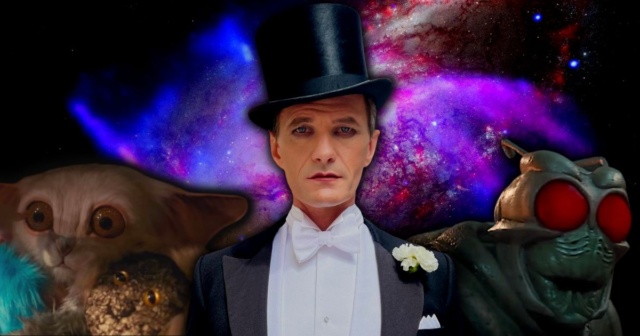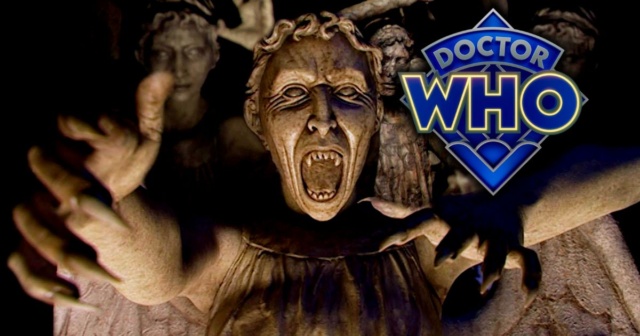‘Doctor Who’ at 60: The Best Dalek Episodes

What’s Doctor Who without the Daleks? As the first aliens the Doctor ever faced in the show, the Daleks have been here since the very beginning. And, as loathsome and evil as they may be, there’s no other Doctor Who monster quite as iconic, persistent, or strangely beloved. Each Doctor has faced off with the scourges of Skaro on screen at least once. They’ve battled the Daleks from distant jungle planets, to Earth’s ancient history, and even outside the known universe. It’s no wonder that some of the most memorable episodes in all of Doctor Who are Dalek episodes. In honor of the show’s 60th anniversary, here are my picks for the best Dalek episodes and stories of all time.
9. “Mission to the Unknown” / “The Daleks’ Masterplan” (season 3, episodes 5; 10-21)
The First Doctor’s fourth and final encounter with Daleks, this 13-episode-long saga was epic and precedent-setting. Except for the 14-episode “The Trial of a Time Lord” (which was broken up into four segments), this remains the longest Doctor Who story ever.
What makes “The Daleks’ Masterplan” stand out is its sense of scale. “Mission to the Unknown” was a short prequel, slowly building up the tension for the coming storm. The following episodes in the story would take the TARDIS team all over time and space, ending in a haunting and bleak finale that no doubt left fans stunned. This story felt built-up to and climactic in a way that few other Doctor Who episodes felt at the time.
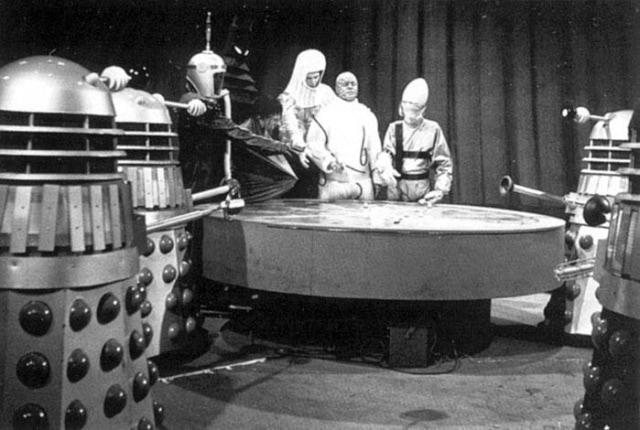
“Masterplan” was also notable for being the first time that a companion died during the series (two companions, at that). This marked the story as one of the darkest episodes in the 60s era and cemented the Daleks as one of the most deadly threats in Doctor Who.
This saga also further situated the Daleks in their place in the Whoniverse. While in their previous three adventures, the Daleks had largely operated in isolation, “Masterplan” showed them interacting with other species in the galaxy. It established them as the feared conquerors of the cosmos that we now know them as.
8. “Remembrance of the Daleks” (season 25, episodes 1-4)
While “Silver Nemesis” was technically the 25th Anniversary episode of Who, “Remembrance” feels much more like a celebration of the series as a whole. Returning to 76 Totter’s Lane in 1963, Seven and Ace find that the Daleks are active here and searching for the Hand of Omega. What’s more, there are not one, but two Dalek factions active in London. The Imperial Daleks and Renegade Daleks are fighting over racial purity, and both sides want the Hand to dominate the others.
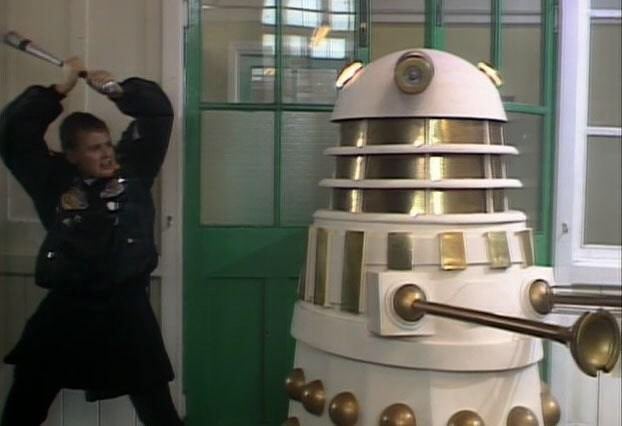
This episode revitalized the Daleks and meaningfully built on their lore. Having two warring Dalek factions helped show just how deadly they truly are, and added some interesting dimension to them as well. “Remembrance” also helped establish a few staples of the Daleks going forward: the X-ray effect and the Dalek levitation. While we had gotten some hints up to this point that Daleks could fly, it had never been centrally featured on screen in such a way. The X-ray gun would also become an iconic part of a Dalek massacre in the revival series.
“Remembrance” helped set the tone for NuWho in general. Doctor Who had been steadily declining in popularity by the late 80s before its cancellation. At the time, no one could have predicted it would be revived in about 15 years. Still, the last two seasons of classic Who helped inspire the creative direction of the revival. “Remembrance” was a big part of this. From the urban setting to the darker subject matters, to the characterization of the Doctor as a darker, more mysterious character, it’s easy to see where Russell T. Davies and Steven Moffat drew a lot of their inspiration for the early NuWho seasons.
7. “The Magician’s Apprentice” / “The Witch’s Familiar” (series 9, episodes 1-2)
The explosive beginning to series 9, “The Magician’s Apprentice” / “The Witch’s Familiar” examined the Doctor, the Daleks, Davros, and the Master on a more introspective level. While it features some memorably silly moments, such as Twelve playing an electric guitar whilst riding a tank, or the first appearance of the sonic sunglasses, this story is one of the darker Dalek stories in NuWho.
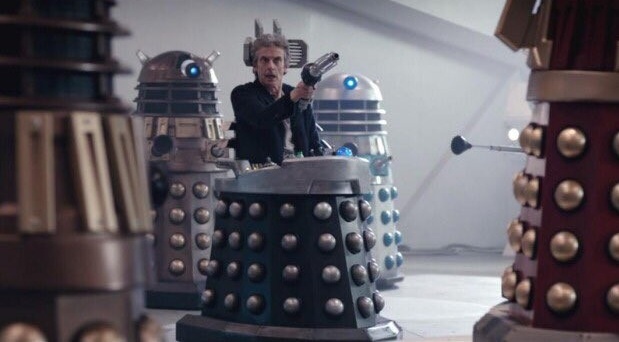
The story reveals a number of uncomfortable truths about the Daleks. It helps develop the Daleks’ relationship with emotion and hatred, and how the Daleks see emotions as a weapon like everything else. We learn the origin of the Daleks’ limited vocabulary, including the word “exterminate.” It also further develops the relationship between Davros and his “children,” and explains how a lot about the Daleks, both the good and the very, very bad, comes from him.
The heart of this episode, though, is what it reveals about this Doctor. Facing a similar dilemma that he did in “Genesis of the Daleks” (which we’ll discuss later), the Doctor is faced with a choice of whether to save a young Davros’s life during the Thousand Year War. Although he saves Davros in the end, there is genuine tension as to whether Twelve will kill Davros and alter history. But, in the end, the Doctor will always be merciful to his enemies, no matter how incurably evil they may be. Even the Daleks.
6. “The Stolen Earth” / “Journey’s End” (series 4, episodes 12-13)
This story is practically synonymous with “grand finale.” We’ve already covered it in our list of best Tenth Doctor episodes, so there’s no need to go into detail about why this is such an excellent, emotional, and showstopping spectacle.
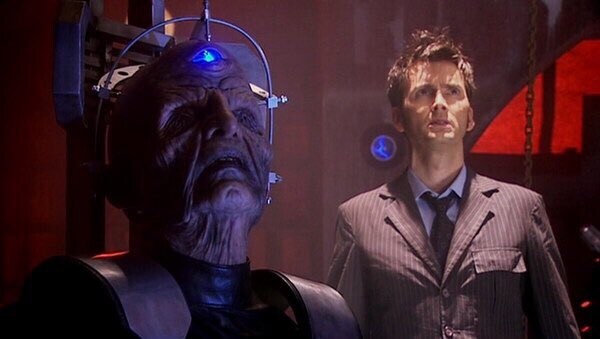
But purely in terms of Dalek episodes, “Stolen Earth” / “Journey’s End” is still exceptional. The massive hordes of Daleks swarming all over the Earth is terrifying. The Dalek plan is more devious and to the point than ever. Wiping out all life in the universe simultaneously seems like something they would have thought of before.
Moreover, this was the episode that reintroduced Davros to the screen, and the NuWho version of the character is exceptionally creepy, intimidating, and maniacal. This story summarizes everything that fans love so much about the RTD era. I, for one, hope that he will bring this kind of energy to the upcoming seasons.
5. “Dalek” (series 1, episode 6)
“Dalek” was the classic that introduced the Daleks to a new generation. It’s perfectly structured to show how deadly and destructive even one single Dalek can be. A lone Dalek has ended up in the collection of secretive billionaire Henry van Statten. Naturally, it escapes, killing almost everyone in van Statten’s secret facility.
What works so well about this episode is just how terrifying it makes the NuWho Daleks. While sometimes treated as a bit of a joke due to their odd appearance, “Dalek” reminds viewers that these cybernetic terrors are no laughing matter. The episode features Daleks flying, cracking complex codes, and exterminating countless armed guards. Most impressively, and horrifically, a Dalek uses its toilet-plunger-like appendage to literally sucker a man to death. Even a somewhat silly-looking appendage can be used for a deadly purpose when it comes to the Daleks.
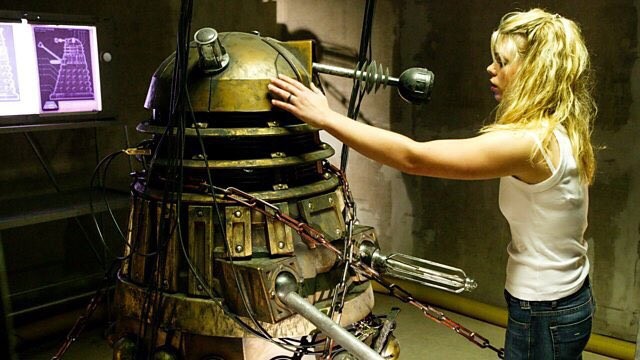
Moreover, Christopher Eccleston’s performance opposite the Dalek is stellar. He portrays a Doctor who’s been irreparably changed by the Time War. He also reminds us that his hatred for the Daleks is alive and well, and stronger than ever.
4. “Power of the Daleks” (season 4, episodes 9-14)
While the live-action footage of this episode remains tragically lost, the BBC released a fully animated version of the story in 2016. And thank goodness they did, because “Power of the Daleks” is fantastic.
“Power” is one of the more haunting Dalek stories. On the planet Vulcan, the Daleks have infiltrated a human colony, pretending to be harmless servants. Naturally, it’s all a part of the Daleks’ scheme, and the result is a terrifying bloodbath at their hands (or plungers). The Daleks are memorably eerie in this episode, and their act of being harmless servants makes them all the more infuriating.
This landmark episode was also the debut of the Second Doctor and the first time we met a new Doctor. To help ease audiences into this new era, the writers decided it was a good idea to feature the already iconic Daleks in this episode. “Power of the Daleks” also set the stage for all post-regeneration episodes to come, and did so excellently. It established the pattern of the Doctor being erratic and unpredictable post-regeneration.
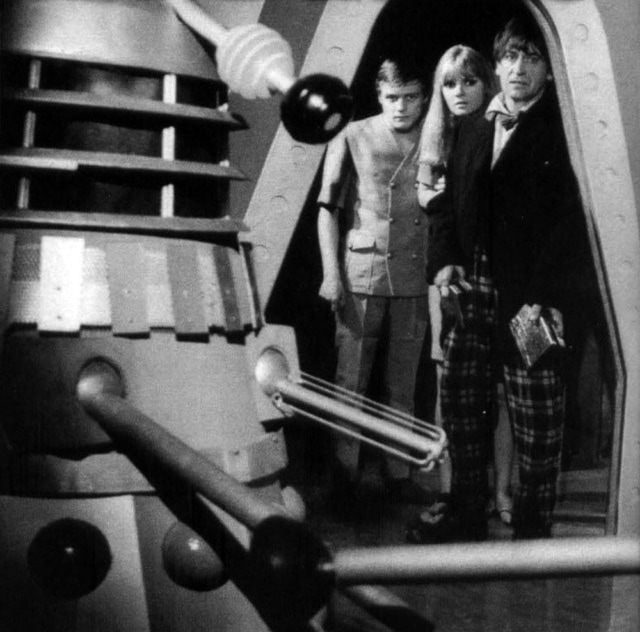
3. “Bad Wolf” / “Parting of the Ways” (series 1, episodes 12-13)
As the finale of the first series of NuWho, “Bad Wolf” / “Parting of the Ways” had a lot riding on it. It had to leave new fans and old fans thrilled, ready for more. And boy, did it deliver.
A few season finales in the classic series, such as “Planet of the Spiders” had built upon running threads that all came together in one big climax. But it was not the standard, as many classic season finales were simply like any other story. “Bad Wolf” / “Parting of the Ways” established the modern Doctor Who season finale: epic, climactic, and built up for the entire season.
While “Dalek” introduced new viewers to the Daleks, this story reintroduced them as a major threat to the human race and the universe. The Doctor is horrified to discover that many Daleks survived the Time War, and have been interfering with Earth once again. It also reintroduced several classic Who concepts, such as the Dalek Emperor.
The Daleks invasion of Satellite 5 has to be one of the grimmest and darkest Dalek massacres ever. Unlike so many other Dalek episodes, we genuinely get to know and care for many of the characters in the station, so watching the Daleks kill them is exceptionally heartbreaking.
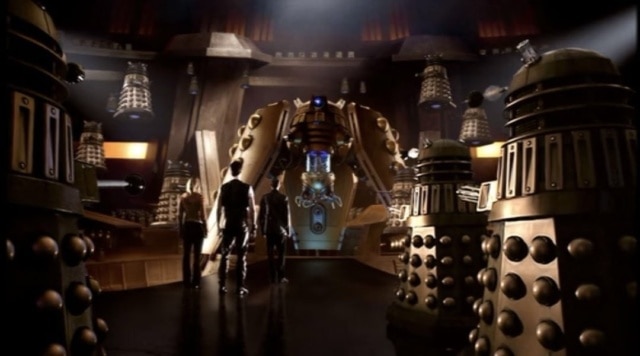
And, of course, this was the first regeneration episode of NuWho. Christopher Eccleston made a brief but unforgettable appearance as the Doctor, so seeing him go was tragic and deeply emotional. We truly couldn’t have asked for a better ending to the first-ever season of NuWho.
2. “The Daleks” (season 1, episodes 5-11)
In its original format, Doctor Who was an educational show, alternating between pure historical episodes and science fiction. While the first ever TARDIS adventure was a somewhat historical adventure with “cavemen,” it was the second time-and-space trip that would forever live in science fiction infamy.
“The Daleks” is a bit of a slow burn, going on for 7 episodes. And yet it is captivating from start to finish. Landing on a dead planet covered in fossilized trees and ruins, One, Susan, Ian, and Barbara become entangled in a war between the Thals and none other than the Daleks. This episode explores concepts of nuclear war, genocide, and taking action against oppression. It’s dark and harrowing stuff, all the more when you remember that the memories of WWII were very much fresh in 1963 Britain.
Their first-ever appearance sent shockwaves through BBC audiences. But what was so unforgettable about the Daleks that they’ve become so popular? Apart from being the first aliens the Doctor ever faced on screen, the Daleks just have some quality about them that makes them terrifying in the strangest ways. Perhaps it is the uncanniness of their voices. Maybe it’s their total alien-ness. Maybe it’s the ever-present allegory to Nazism and racial purity. Whatever the case, the Daleks would never be forgotten since they first threatened Barbara Wright at plunger-point.
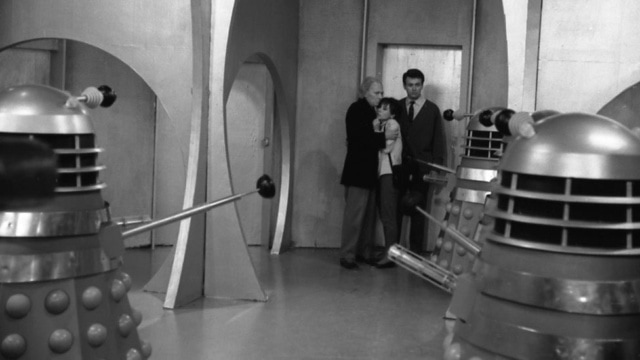
The BBC just announced that an edited, colorized version of this story will air on November 23rd on BBC Four. The new version of the story will feature an updated score, and sound effects, with a run time of 75 minutes long.
1. “Genesis of the Daleks” (season 12, episodes 11-16)
There’s an emotion somewhere between satisfaction and horror. It doesn’t come out often, but I often feel this way about villain origin stories. There is something about discovering why someone or something became so twisted. On one hand, there’s the gratification of discovering the true motivations behind so much evil. On the other, there’s the fear of realizing these motivations are understandable, and the terror of resonating with them a little too much.
Such is the nature of “Genesis of the Daleks.” The Time Lords recruit the Fourth Doctor to wipe out the Daleks at their inception after he lands on a Skaro devastated by the Thousand Years war. But as the Doctor discovers, committing genocide is a deeply morally questionable task, even for a species as evil as the Daleks.
Journeying across war-torn Skaro, Four, Sarah Jane, and Harry Sullivan encounter both Kaleds and Thals, and see firsthand what a thousand years of war does to a civilization. Both species are militaristic, battle-hardened, and constantly suspicious. Moreover, both sides are committed to the utter obliteration of the other. The Kaled-Thal war brings to mind any number of real-world conflicts. While the war was specifically meant to parallel World War II, the war could stand in for any long bitter conflict.
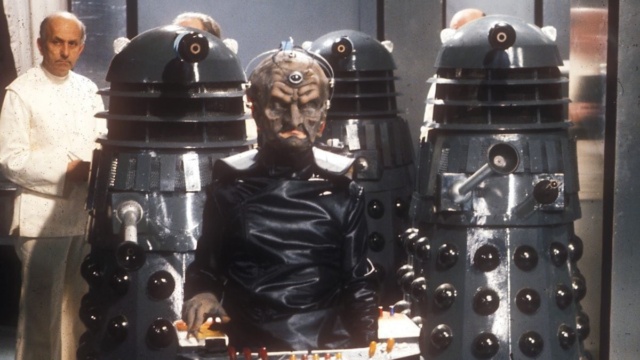
In “Genesis” we first meet the creator of the Daleks: the scientist Davros. He leaves an unforgettable impression in this serial. It’s easy to understand why he became such a popular recurring villain: Michael Wisher absolutely kills his first (and sadly only) performance as the character. He leads a team of equally cold and militaristic scientists, dedicated to developing new horrifying weapons to end the war. But Davros’s crowning achievement is the Daleks, and he plans to mutate the entire Kaled species into these weapons of destruction.
While clearly villainous, the episode’s power comes from reminding the audience that Davros’s actions are good-intentioned in a dark, twisted way. He wants the traumatic war to end, and to preserve his species. So when the Doctor is finally faced with the choice of whether to wipe out the Daleks, it’s no wonder that he questions the morality of it. If he commits genocide to end a war and save countless lives, is he no better than Davros himself?
“Genesis of the Daleks” is epic, thought-provoking, and ambitious. It’s everything you could want from Classic Doctor Who, and from a Dalek serial. It’s essential viewing for any Whovian and a sci-fi classic.
That’s it for my list of best Dalek episodes in Doctor Who!
Do you agree or disagree with my list? What are some of your favorite Dalek episodes of Doctor Who? Let us know on The Cosmic Circus Discord or over on social media @mycosmiccircus!
Doctor Who’s 60th Anniversary specials drop on November 25th on BBC and Disney+! Check out the new trailer here, and check out some of our other reviews and features about Doctor Who here!
Doctor Who 60th Anniversary Villains Guide

